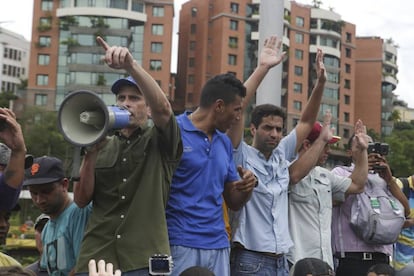Venezuela validates over a million signatures for recall referendum
National Electoral Council accepts 1.3 million names presented by opposition, the first step to removing President Maduro from office

Venezuela’s National Electoral Council (CNE) is on its way to being able to announce the next step in the process to call a recall referendum against the country’s current president, Nicolás Maduro. After a meeting with the CNE, the executive secretary of the Democratic Unity Roundtable (MUD) opposition group, Jesús Torrealba, said that it had validated 1.3 million of the nearly two million signatures on the petition calling for a vote on Maduro’s continuing leadership. In fact, the opposition has delivered more than six times the number of signatures needed to start the process.
The news comes after 38 days of administrative delays at the CNE, a government agency controlled by the chavista regime. The opposition hopes that the CNE will announce where signatories can go to confirm their identity in person with a fingerprint test. Once that step has been completed, CNE will ask MUD to gather 20% of the electorate in order to call for the plebiscite.
If the referendum takes place after the first two weeks of January 2017, its result will have no political effect
But time is running against the opposition, because, if the referendum takes place after the first two weeks of January 2017, its result will have no political effect. Maduro’s vice president would take over, finish his term, and call presidential elections for December 2018.
Torrealba’s meeting with CNE showed how deep the schism between chavistas and the opposition truly is. Just one of the CNE’s five leaders, Luis Emilio Rondón – the only head of the organization who is looking out for the interests of the opposition – showed up.
The announcement comes at the height of tensions between the two sides, which are both deeply entrenched in their positions. The opposition has decided to set the tone for the dialogue regarding the referendum. MUD has held preliminary meetings in the Dominican Republic with three former Ibero-American presidents serving as mediators. Yet, Maduro said on his TV show that the referendum is not an obligation, but a right established in the Constitution. “The option of a referendum with an option for a recall will not be on the table,” he said. “Venezuela does not need a recall referendum but to restore its economy. Only one revolutionary president can govern this country: Nicolás Maduro Moros.”
The Venezuelan head of state has announced that he will deliver a letter with three options to the mediators: create a truth commission, sign an agreement for a work plan and respect of Venezuelan institutions and a pact to “renounce political, criminal and social violence and conspiracy.” Chavistas see dialogue as a political forum where both parties can explain their conflicting views of the problems the country faces.
Maduro has tried to send a firm message just as food shortages are worsening and chaos deepens
Maduro has tried to send a firm message just as food shortages are worsening and the chaos created by the chavista model of economic development deepens. The president also proposed the creation of Local Committees for Supply and Production (CLAP), the Bolivarian version of soviets. The committees, appointed by decree, would distribute basic foodstuff to poor areas. “All resources go to CLAP. If they triumph, peace in the republic will be guaranteed,” Maduro said.
The chavista regime wants to convince its followers that there is enough food production and that supermarket shelves are empty because private businesses are boycotting distribution. The government assures Venezuelans that it has already created nearly 16,000 CLAP to sell food without intermediaries. “We are demanding that businesses sell us 70% of what they produce in order for us to distribute it,” Vice President Aristóbulo Istúriz said on the president’s TV show. Though he has less and less room left to maneuver, Maduro is still trying to tighten controls on the economy.
English version by Dyane Jean François.
Sign up to our newsletter
EL PAÍS English Edition has launched a weekly newsletter. Sign up today to receive a selection of our best stories in your inbox every Saturday morning. For full details about how to subscribe, click here.
Tu suscripción se está usando en otro dispositivo
¿Quieres añadir otro usuario a tu suscripción?
Si continúas leyendo en este dispositivo, no se podrá leer en el otro.
FlechaTu suscripción se está usando en otro dispositivo y solo puedes acceder a EL PAÍS desde un dispositivo a la vez.
Si quieres compartir tu cuenta, cambia tu suscripción a la modalidad Premium, así podrás añadir otro usuario. Cada uno accederá con su propia cuenta de email, lo que os permitirá personalizar vuestra experiencia en EL PAÍS.
¿Tienes una suscripción de empresa? Accede aquí para contratar más cuentas.
En el caso de no saber quién está usando tu cuenta, te recomendamos cambiar tu contraseña aquí.
Si decides continuar compartiendo tu cuenta, este mensaje se mostrará en tu dispositivo y en el de la otra persona que está usando tu cuenta de forma indefinida, afectando a tu experiencia de lectura. Puedes consultar aquí los términos y condiciones de la suscripción digital.








































